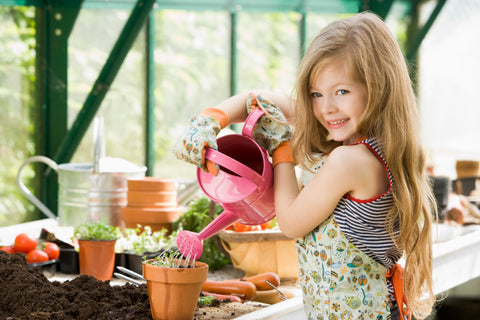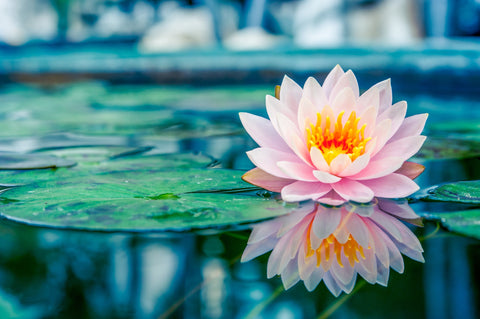In this day and age, when children are often exposed to screens and digital content, contact with nature is becoming increasingly important. Gardening, planting, and watching plants grow offer children a unique learning experience that combines play, exploration, and responsibility. Although at first glance it may seem like a simple activity – planting a seed, watering it, and waiting for something to grow – in reality it is a rich journey full of life lessons.
Below, we will look at why gardening is valuable for children, what skills and values they acquire while doing so, and how parents and educators can bring this wonderful contact with the earth closer to children.
You can view products suitable for children HERE.
🌿 Developing responsibility and patience
When a child plants a seed, he or she takes on the role of guardian. He or she learns that a plant needs regular watering, enough light, and proper care. If the child forgets, the plant will not develop as it should. This is a practical lesson in responsibility: the child understands that his or her actions directly affect the outcome.
At the same time, gardening is a great lesson in patience. Plants don't grow overnight. Children learn that small, regular steps are important and that effort pays off over time. They can transfer this knowledge to other areas of life – from school to personal goals.
🌿 Understanding nature and the cycle of life
By following the growth of a plant from seed to flower or fruit, a child discovers natural cycles. He learns that everything in nature has its time – sowing, growing, flowering, harvesting and resting. This helps him understand the broader processes of life.
Through gardening, children gain a sense of the seasons and weather. They notice that plants thrive best in spring or summer, that they are warmed by the sun, watered by the rain, and that they are dormant in winter. This understanding of natural laws is valuable because it strengthens respect for nature and the environment.
🌿 Learning about healthy eating
If a child plants vegetables or fruits, they will likely be excited to try what they have grown. Many parents notice that children who participate in growing food are more likely to eat vegetables that they would otherwise refuse.
Gardening is a great way to show children where their food comes from – that carrots don’t grow in the grocery store, but in the ground. This knowledge builds a healthier relationship with food, a respect for the work it takes to produce it, and can positively influence lifelong eating habits.
🌿 Developing fine motor skills and sensory abilities
Gardening involves a variety of movements – sowing small seeds, raking soil, watering, pulling weeds. All of this strengthens fine motor skills, coordination, and the sense of touch.
Children encounter different textures and sensations: soft soil, rough seeds, smooth leaves, wet water. This stimulates their sensory perception and enriches them with experiences that a screen cannot offer.
🌿 Encourage curiosity and a spirit of exploration
Children are naturally curious. When they see a small seed grow into a large plant, they often ask questions: How is that possible? What does a plant need? Why do some grow faster than others?
Gardening thus encourages a spirit of inquiry and curiosity about natural science. The child learns to observe, draw conclusions, and investigate. This is the basis of scientific thinking that will accompany him throughout his education and life.
🌿 Strengthening emotional development
Contact with nature has a calming effect. Children who garden often develop a sense of inner peace and contentment. When they watch a plant grow, when they nurture and care for something, they develop empathy and a sense of connection.
Success, when a plant blooms or bears fruit, brings pride and self-confidence. The child experiences a sense of accomplishment – something they only cared about has succeeded. This reinforces a positive self-image.
🌿 Teamwork and collaboration
Gardening can be an individual activity, but it's even more enjoyable when we do it together – as a family or a group at kindergarten or school. This way, children learn about cooperation, sharing tasks, and sharing joy when success comes.
Group gardening strengthens the sense of belonging and togetherness. The child sees that the results are even better when we cooperate and help each other.
🌿 Environmental awareness
When children understand how much effort it takes to grow something, they begin to relate to food and nature differently. They are less likely to throw food away, because they know how much time and care it takes to get it to the table.
At the same time, they learn the importance of healthy soil, clean water and air. Gardening is a great introduction to environmental awareness – children develop respect for the environment and a desire to protect it.
🌿 Connecting families and creating memories
Gardening together can become a cherished family ritual. Parents and children plant, water, and harvest together. These are moments of connection, conversation, and joy that create beautiful memories.
Later, children will remember planting tomatoes or picking strawberries with their parents, which strengthens family bonds and the feeling of warmth at home.
🌿 Learning life lessons
Perhaps one of the greatest values of gardening is that it teaches children life lessons. They learn that failure is not the end – sometimes a plant won’t succeed, but it’s an opportunity to learn. They understand that hard work is rewarded, but that perseverance, care, and love are also needed.
These values and lessons are not limited to the garden – they follow a child through all areas of life. It is important for children to plant.
How to start?
You don't need a big garden to start with. A balcony, a few pots or even a windowsill are enough. We can offer the child simple seeds that germinate quickly – for example, radishes, lettuce, beans or sunflowers. It is important that the child participates in all the steps: choosing the seeds, sowing, watering and later observation.
Make gardening fun – your child can draw pot labels, track changes, keep a little journal, or take photos of the growth. This will make the experience even more interesting.
Gardening and planting for children is much more than just a pleasant activity. It is a school of life in which children learn responsibility, patience, cooperation and respect for nature. It strengthens their curiosity, fine motor skills and awareness of a healthy lifestyle.
The best part is that this learning comes through play, contact with nature, and shared moments with family. A child who learns to plant and care for plants acquires valuable knowledge and values that will accompany them throughout their lives.



